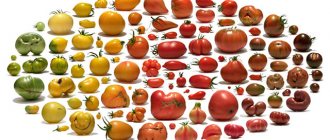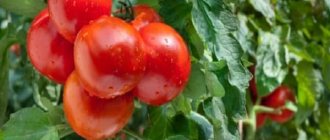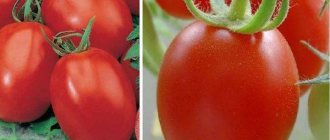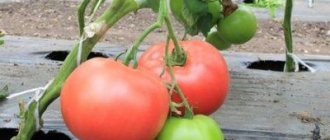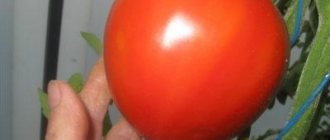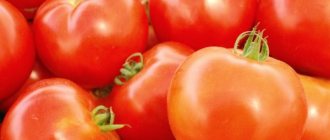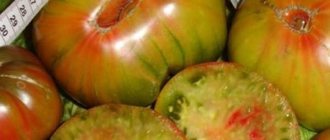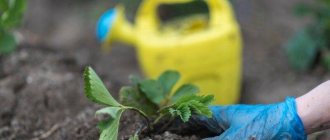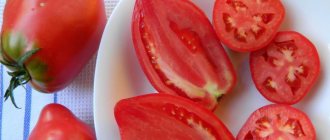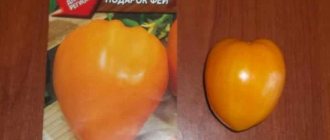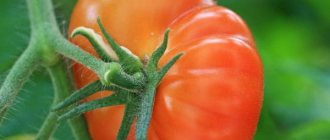The love for dark-fruited tomatoes is associated not only with the unusual taste, but also because of simple agricultural technology. Black Russian is a wonderful variety of English selection - hardy and stable. Thanks to its delicious properties, it is perfect for salads and as a complement to meat and fish dishes.
| Height | Landing location | Ripening time | Fruit color | Fruit size | Origin | Fruit shape |
| Tall | Greenhouse, Open ground | Mid-season | Black | Large | Variety | Flat-round |
Tomato “Black Russian”: description of the variety
| Variety name | Black Russian |
| general description | Mid-season indeterminate variety |
| Originator | England |
| Ripening period | 100-110 days |
| Form | Flat-rounded or heart-shaped, with slight ribbing at the stalk |
| Color | Burgundy-chocolate |
| Average weight of tomatoes | 300-400 grams |
| Application | Dining room |
| Productivity of the variety | 4-5 kg per bush |
| Features of cultivation | Standard agricultural technology |
| Disease resistance | Sensitive to viruses and fungi |
The variety belongs to the old classic ones, bred by English breeders.
Recommended for growing in glass greenhouses and film greenhouses; in warm regions, tomatoes can be planted in open ground. The collected fruits are well stored; they can be picked at the technical ripeness stage for ripening at room temperature. Black Russian is a mid-season, high-yielding variety. The bush is indeterminate, tall and spreading, with abundant green mass. In the greenhouse the plants reach a height of 1.8 m; in open beds the bushes are more compact, up to 1.2 m high. They require pinching and fastening to a strong support. The leaf is dark green, medium-sized. The fruits ripen in clusters of 3-5 pieces. Productivity depends on growing conditions; it can reach 4-5 kg per bush.
Advantages and disadvantages Among the main advantages of the variety:
- very tasty delicacy fruits;
- good yield;
- low maintenance requirements;
- Tomatoes are well stored and can be transported.
Among the disadvantages is the need to form a bush.
You can compare the yield of this variety with others in the table:
| Variety name | Productivity |
| Black Russian | 4-5 kg per bush |
| Marissa | 20-24 kg per square meter |
| Sugar cream | 8 kg per square meter |
| Buddy f1 | 8-10 kg per square meter |
| Siberian early ripening | 6-7 kg per square meter |
| Golden stream | 8-10 kg per square meter |
| Pride of Siberia | 23-25 kg per square meter |
| Liana | 2-3 kg per bush |
| The Lazy Man's Miracle | 8 kg per square meter |
| President 2 | 5 kg per bush |
| Leopold | 3-4 kg per bush |
Read on our website: the most common diseases of tomatoes in greenhouses and ways to combat them. Which tomatoes are resistant to most diseases and immune to late blight? What methods of protection against late blight exist?
General characteristics of the tomato Funtik f1 and description of the fruits of the hybrid variety
Many gardeners organize tomato yield competitions.
If a summer resident wants to surprise his neighbors, he should pay attention to the Funtik f1 tomato. These are large tomatoes that give a very good harvest
Their taste is simply excellent. Despite the fact that tomatoes are quite large, they have a universal purpose and are suitable for various uses. But still, Funtik tomatoes have gained the greatest popularity as an ingredient in salad. Their delicate sweet taste makes them an ideal addition to summer vegetable appetizers.
Funtik is a hybrid, so only original seeds purchased from the manufacturer should be used for cultivation. In this case, you can get ideal fruits with good weight and excellent taste. The Funtik variety was specially bred by Russian specialists. It has universal characteristics, so it is suitable for both open ground and greenhouses. The yield will be high in any case.
Description of the variety
This hybrid is classified as an indeterminate type. This suggests that the plant can have unlimited growth, so it should be pinched at the top. It is advisable to do this when the tomato reaches the 2 meter mark.
If you do not carry out the pinching procedure, the plant can stretch above 2.5 meters. In greenhouse conditions, the tomato can be even larger. But this has a bad effect on yield, since the tomato gives a lot of energy to the greens instead of saturating the fruits.
The plant grows very tall, but not too spreading, so the planting pattern for the bushes can be quite dense. You can place 6 tomatoes per 1 m².
Hybrid Funtik produces a large number of fruits. They are formed on brushes, of which there can be up to 12 pieces on each bush. There are 6 large tomatoes in one bunch.
The big advantage is that the plant produces all its fruits at once. This is convenient for those who grow tomatoes for canning. The productivity of the Funtik hybrid is very high. With proper agricultural technology, gardeners harvest up to 10 kg of delicious tomatoes from each bush.
The highest yield is observed with proper care of tomatoes. They must be well fertilized, weeded and moderately watered. As for spraying against diseases, it will not be superfluous for preventive purposes. But the manufacturer assures that this hybrid is highly resistant to late blight, verticillium and tobacco mosaic.
Fruit characteristics
The characteristics and description of the variety indicate that these tomatoes have a universal purpose and can be suitable for any type of use.
The tomatoes turn out quite large. Their average weight is 230 g. The color of the fruit is red, and the taste is sweet and very pleasant. Large tomatoes are not very convenient to preserve as a whole, but Funtik fruits are quite suitable for juice, sauce or tomato paste. In addition, they are considered an excellent addition to summer vegetable salad.
The fruits of this variety have a fairly dense skin, so they can be easily transported even over long distances without the risk of losing their presentation. Moreover, tomatoes are stored in a cool place for a very long time. If you harvest in August, you can enjoy the pleasant taste of fresh tomatoes until mid-autumn.
Reviews about the Funtik tomato are extremely positive.
Veronica, Shakhty: “Excellent tomato, I have never seen such a productive tomato. To the envy of all my neighbors, I collected 10-12 kg per bush! The fruits are very tasty, aromatic, fleshy and elastic. Do not crack during ripening and storage. They can lie there for a long time!”
Marina, Moscow region: “I grew it in a greenhouse. The bushes were not sick, the yield was as stated by the manufacturer. I used tomatoes mainly for pasta and salads. In general, it was not possible to preserve it; the fruits grew too large!”
Characteristics
- The fruits are large, weighing from 300 to 400g.
- The shape is flat-rounded or heart-shaped, with slight ribbing at the stalk.
- During ripening, the fruits change color from light green to a beautiful burgundy-chocolate.
- Tomatoes have a large number of seed chambers, the pulp is juicy, fleshy, and has a pleasant sweet taste.
- High content of sugars, amino acids and vitamins.
Juicy, fleshy fruits are ideal for fresh consumption; they are used to prepare salads, purees, and sauces. Ripe fruits produce a sweet, thick juice of an unusual color.
You can compare the weight of the fruits of this variety with others in the table:
| Variety name | Fruit weight |
| Black Russian | 300-400 grams |
| Rocket | 50-60 grams |
| King of the Market | 300 grams |
| Brawler | 70-300 grams |
| Gulliver | 200-800 grams |
| Honey Heart | 120-140 grams |
| Shuttle | 50-60 grams |
| Yamal | 110-115 grams |
| Kate | 120-130 grams |
| The Tsar Bell | up to 800 grams |
| Golden heart | 100-200 grams |
What does it look like
Breeders developed a variety for indoor soil. Tomato grows well in film, glass, and plastic unheated greenhouses. In the southern regions, under favorable climatic conditions, the fruits ripen in open ground.
Description of tomato:
- bush up to 180 cm high (outdoors < 120 cm);
- the color of the leaf blades is dark green;
- average ripening period (120 days from germination to first harvest);
- the bush forms clusters of up to 5 berries each;
- severe fouling of shoots;
- small leaves.
The average tomato yield is 5 kg/bush. Competent agricultural technology can increase it by 20%.
Features of cultivation
Seeds are sown in the second half of March. Before planting, they can be treated with a growth stimulator for better germination. The soil is made up of a mixture of garden soil and humus.
Advice: It is preferable to use the soil in which the grown seedlings will be planted in the future. It is taken from the beds where legumes, cabbage, and herbs grew. Do not use soil from eggplants or peppers.
The seeds are sown with a slight depth, the plantings are sprayed with water, covered with film and placed in a warm place. After emergence, tomatoes need bright sunlight or artificial light, moderate watering with warm water and a temperature of 20 to 22 degrees. When the first true leaves appear on the seedlings, they are picked and fed with liquid complex fertilizer.
Transplantation begins in the second half of May-early June. The soil is mixed with humus, wood ash is laid out in the holes (1 tablespoon per plant). For 1 sq. m can accommodate 3 plants. They need to be watered sparingly, only with warm, settled water. Tomatoes are sensitive to fertilizing. Before flowering, nitrogen-containing complexes are preferred; after the formation of ovaries, the bushes are fed with magnesium sulfate or sprayed with an aqueous solution of superphosphate.
To improve the quality of the fruit, tomatoes are formed into 2-3 stems, removing the lateral stepsons above the third cluster. Pinching off excess flowers on the racemes, as well as removing the lower leaves, will help speed up the formation of ovaries. Be sure to tie it to stakes or trellises.
On our website you will find a lot of useful information on how to properly grow tomato seedlings. Read all about planting seedlings at home, how long after planting the seeds sprout and how to water them correctly. And also how to grow tomatoes in twists, upside down, without soil, in bottles and using Chinese technology.
Agrotechnics of cultivation
The rules for growing tomatoes are common:
- sowing for seedlings on March 15-20;
- planting in a permanent place in early May (in open ground - after late spring frosts);
- applying fertilizing during planting (2 tablespoons of double superphosphate under the plant);
- timely watering (after the soil has completely dried, 5 liters per bush);
- mulching beds;
- formation into 2 stems;
- stepsoning;
- lightening of the ovaries;
- obligatory garter of stems and brushes;
- removal of leaves before the ovary fills;
- Nitrogen application is recommended before flowering;
- then feed with mineral complexes every 10 days;
- stop applying a month before the harvest ripens;
- ventilate the greenhouse;
- Remove ripe fruits in a timely manner.
See also
Gardener's lunar sowing planting calendar for June 2021Read
It is necessary to regularly monitor the temperature in the greenhouse. When the temperature rises above 30 ⁰C, the pollen is sterilized and the tomato does not set fruit.
Diseases and pests
Old varieties of tomatoes are sensitive to viral and fungal diseases. Preventive measures will help protect them. Before planting, the soil is spilled with a solution of potassium permanganate or copper sulfate.
In the intervals between waterings, the soil is loosened; to prevent root rot, it can be mulched with humus or peat. During the late blight epidemic, plantings are treated with copper-containing preparations.
Insect pests can be controlled using industrial insecticides, as well as home remedies: infusion of celandine or onion peels, ammonia solution or laundry soap.
Large-fruited, easy-to-care tomatoes of the Black Russian variety are perfect for home gardens. Seeds for subsequent plantings can be collected independently from ripened fruits.
Video
We invite you to watch a video about varieties of black tomatoes:
| Mid-season | Mid-early | Late ripening |
| Anastasia | Budenovka | Premier |
| Raspberry wine | Mystery of nature | Grapefruit |
| Royal gift | Pink King | De Barao the Giant |
| Malachite Box | Cardinal | De Barao |
| Pink heart | Babushkino | Yusupovsky |
| Cypress | Lev Tolstoy | Altaic |
| Giant raspberry | Danko | Rocket |
If you find an error, please select a piece of text and press Ctrl+Enter.
